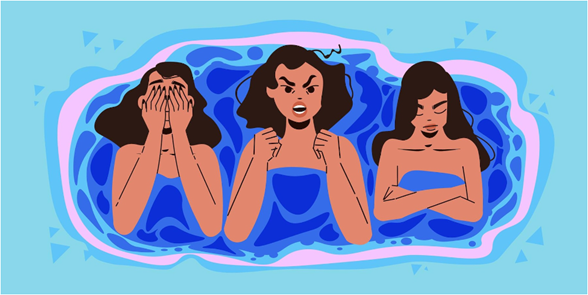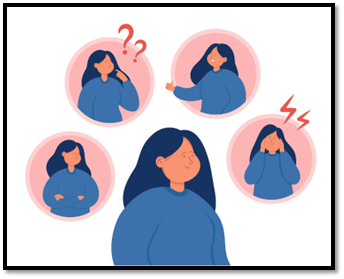|
Rowan Hunt, MS and Hannah Fitterman-Harris, PhD Despite their depiction in media, we know that eating disorders are about more than food, weight, and bodies. Often, it’s easier to talk about these things than what is underlying the eating disorder: emotions. Emotions are so human; everyone experiences them. However, sometimes feeling emotions (especially emotions like anger, sadness, and anxiety) can be uncomfortable. In the face of this discomfort, it’s easy to get caught up in trying to avoid the emotions. This also seems to be true in the case of eating disorders. Individuals sometimes use eating disorder behaviors to try to reduce or avoid negative feelings.(1) Research has shown that people who had difficulty recognizing and regulating emotions were also more likely to have eating disorder symptoms.(2) Additionally, those with eating disorder symptoms were less likely to use helpful coping strategies to manage their emotions – like accepting their emotions, thinking differently about a situation to decrease negative emotions, or problem-solving – and were also more likely to use unhelpful strategies such as rumination (continuously focusing on a negative thought or situation), avoiding emotions, and suppressing emotions.(2) To summarize, individuals with eating disorders tend to feel more negative emotions, less positive emotions, and tend to have a harder time sitting with those emotions or using helpful coping strategies. This tendency towards emotions like sadness, anger, and anxiety can prompt individuals with eating disorders to turn to eating disorder behaviors to distract from or relieve unpleasant emotions. However, we know that emotions are like signals – and when you ignore the message that they are trying to send to you, the alarm just gets louder. As a result, these unpleasant emotions can rebound and come back stronger – thus driving an unfortunate cycle of more eating disorder behaviors. So, how do we get out of this cycle? Research suggests that teaching individuals to use more helpful (and less unhelpful) ways of regulating their emotions could help to improve eating disorder symptoms.(2) One place to start is by learning the purpose of your emotions. It may feel like our emotions (again – especially emotions like anger, sadness, and anxiety) don’t serve any purpose but to make us feel bad. However, we know that all emotions (even the “bad” ones) do something for us. By learning the purpose of our emotions, it can be easier to accept them (or at least tolerate them). “Emotions are not problems to be solved. They are signals to be interpreted.” – Vironika Tugaleva So why do we have emotions? What do they do for us?
In summary, emotions communicate important information. When we use our emotions as signals and respond to them with curiosity rather than fear or avoidance, they can tell us a lot about what’s going on in the world and what we need in any given moment. The next time you’re feeling sad, angry, or fearful, instead of trying to stuff down the emotion try thinking about what that emotion is trying to tell you! References
0 Comments
|
Archives
January 2024
Categories |
- About
- People
- Our Research & Publications
-
Participate in Research
- Personalized Interventions and Outcomes: Navigating Eating Disorder Experiences and Recovery (PIONEER) Study (Online)
- Youth Eating Study (YES!)
- Tracking Restriction, Affect and Cognitions (TRAC) Study (Online)
- Virtual Reality Study
- Facing Eating Disorder Fears Study (Online)
- Personalized Treatment and CBT-E Study (Online)
- Body Project Summer Camp
- The Body Project
- Clinical Screener Study (Online)
- Clinic, Supervision, and Consultation
- Blog & In the Press
-
Archived Studies
- Predicting Recovery Study (Online)
- Online Single Session Resources
- Reconnecting to Internal Sensations and Experiences (RISE) Study
- Web-Based Mindfulness Study
- Personalized Treatment Study
- Online Imaginal Exposure Study
- In-Vivo Imaginal Exposure Study
- Daily Habits 3 Study
- Daily Mood Study
- COVID-19 Daily Impact Study
- Conquering fear foods study
- Louisville Pregnancy Study
- Approach and Avoidance in AN (AAA) Study
- Web-Based Mindfulness for AN & BN Study
- Barriers to Treatment Access (BTA) Study!
- Mindful Self-Compassion Study
- Network EMA Study
- Legacy of Hope Summit Report
- DONATE-CURE EATING DISORDERS!
- Directions
- Statistical Consultation
- About
- People
- Our Research & Publications
-
Participate in Research
- Personalized Interventions and Outcomes: Navigating Eating Disorder Experiences and Recovery (PIONEER) Study (Online)
- Youth Eating Study (YES!)
- Tracking Restriction, Affect and Cognitions (TRAC) Study (Online)
- Virtual Reality Study
- Facing Eating Disorder Fears Study (Online)
- Personalized Treatment and CBT-E Study (Online)
- Body Project Summer Camp
- The Body Project
- Clinical Screener Study (Online)
- Clinic, Supervision, and Consultation
- Blog & In the Press
-
Archived Studies
- Predicting Recovery Study (Online)
- Online Single Session Resources
- Reconnecting to Internal Sensations and Experiences (RISE) Study
- Web-Based Mindfulness Study
- Personalized Treatment Study
- Online Imaginal Exposure Study
- In-Vivo Imaginal Exposure Study
- Daily Habits 3 Study
- Daily Mood Study
- COVID-19 Daily Impact Study
- Conquering fear foods study
- Louisville Pregnancy Study
- Approach and Avoidance in AN (AAA) Study
- Web-Based Mindfulness for AN & BN Study
- Barriers to Treatment Access (BTA) Study!
- Mindful Self-Compassion Study
- Network EMA Study
- Legacy of Hope Summit Report
- DONATE-CURE EATING DISORDERS!
- Directions
- Statistical Consultation



 RSS Feed
RSS Feed
